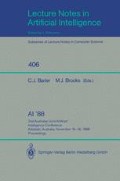Abstract
In general, competent algebraists can easily recognize expressions which hold high potential for the successful application of commonly applied algebraic transformations, such as transferring terms to the other side of an equation and factoring out common factors. Novice students, however, have difficulty identifying these expressions and assessing the promise of the application of particular transformations. In order to teach these skills, an Intelligent Tutoring System must be able to reason about algebraic expressions in a way which is accessible to a student. In this paper, we describe a mechanism for the representation and manipulation of algebraic expressions which is able to characterize algebraic transformations commonly performed by algebraists. This mechanism has been implemented in a system called DISSOLVE which generates explainable and intuitively appealing solutions to algebraic equations at the high-school level.
This research was supported in part by grant SC-14/87 of the Monash University Special Research Fund.
Preview
Unable to display preview. Download preview PDF.
References
Brown, W.S., Hyde, J.P. and Tague, B.A. (1964), The ALPAK System for Non-numerical Algebra on a Digital Computer — II. Bell System Technical Journal, 1964, 43(2), pp. 785–804.
Bundy, A. and Welham, B. (1981), Using Meta-level Inference for Selective Application of Multiple Rewrite Rules. Artificial Intelligence, 1981, 16(2), pp. 189–211.
Bundy, A. (1983), The Computer Modeling of Mathematical Reasoning, Academic Press.
Hearn, A. (1987), The REDUCE User's Manual — Version 3.3. Rand Publication CP78 (Rev. 7/87), July 1987.
Lewis, C. (1981), Skill in Algebra. In J.R. Anderson (Ed.), Cognitive Skills and Their Acquisition, Lawrence Erlbaum Associates, Hillsdale, New Jersey.
McArthur, D. (1984), A Graphical Interactive Tutorial Environment for Basic Algebra. Rand Corporation, Santa Monica, California, July 1984.
McArthur, D. (1985), Developing Computer Tools to Support Performing and Learning Complex Cognitive Skills. In K. Pedzek, D. Berger and B. Bankes (Eds.), Applications of Cognitive Psychology: Computing and Education, Lawrence Erlbaum Associates, Hillsdale, New Jersey.
McArthur, D. (1986), A simple System for Solving Problems in Basic Algebra. Unpublished Manuscript.
Moses, J. (1975), A MACSYMA Primer. MathLab Memo No. 2. Computer Science Laboratory, Massachusetts Institute of Technology.
Sleeman, D. and Brown, J. S. (1982), Intelligent Tutoring Systems, Academic Press.
Turnbull, H.W. (1939), Theory of Equations. Oliver and Boyd Ltd.
Zukerman, I. (1986), Computer Generation of Meta-technical Utterances in Tutoring Mathematics. Doctoral Dissertation, University of California, Los Angeles.
Author information
Authors and Affiliations
Editor information
Rights and permissions
Copyright information
© 1990 Springer-Verlag Berlin Heidelberg
About this paper
Cite this paper
Oliver, J., Zukerman, I. (1990). DISSOLVE : A system for the generation of human oriented solutions to algebraic equations. In: Barter, C.J., Brooks, M.J. (eds) AI '88. AI 1988. Lecture Notes in Computer Science, vol 406. Springer, Berlin, Heidelberg. https://doi.org/10.1007/3-540-52062-7_73
Download citation
DOI: https://doi.org/10.1007/3-540-52062-7_73
Published:
Publisher Name: Springer, Berlin, Heidelberg
Print ISBN: 978-3-540-52062-7
Online ISBN: 978-3-540-46875-2
eBook Packages: Springer Book Archive

